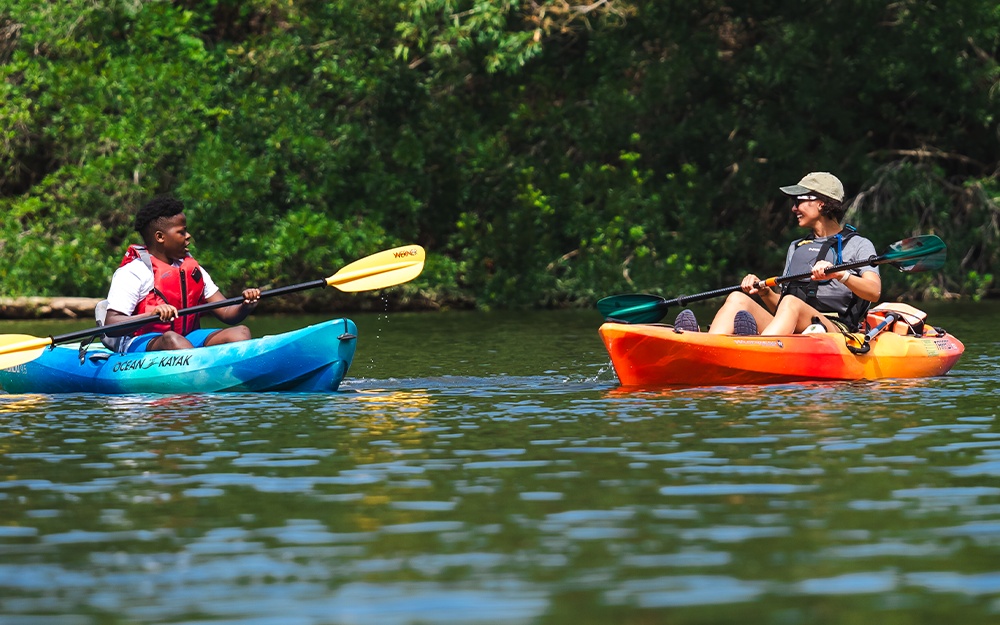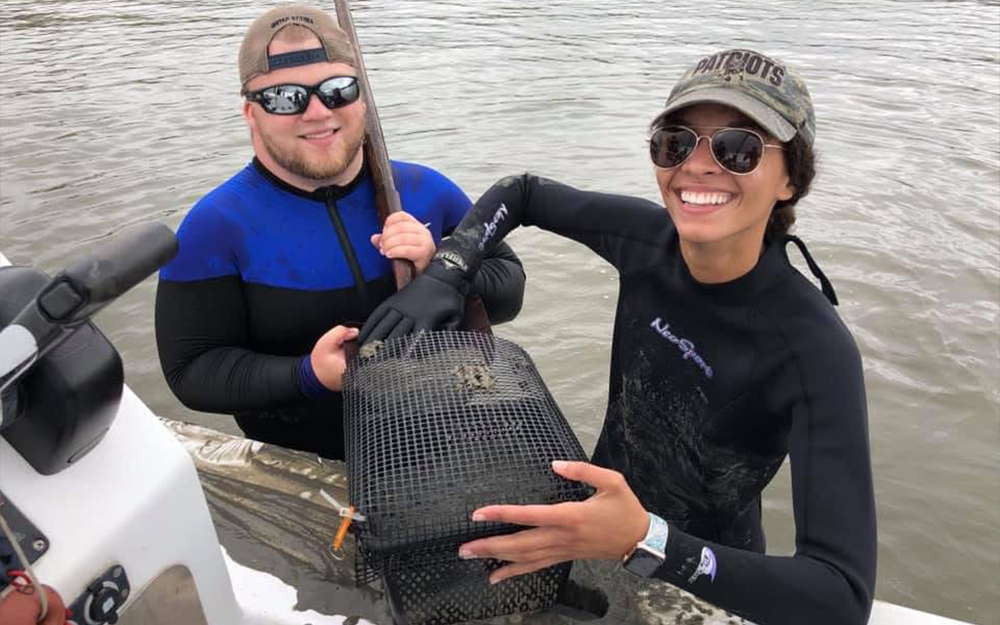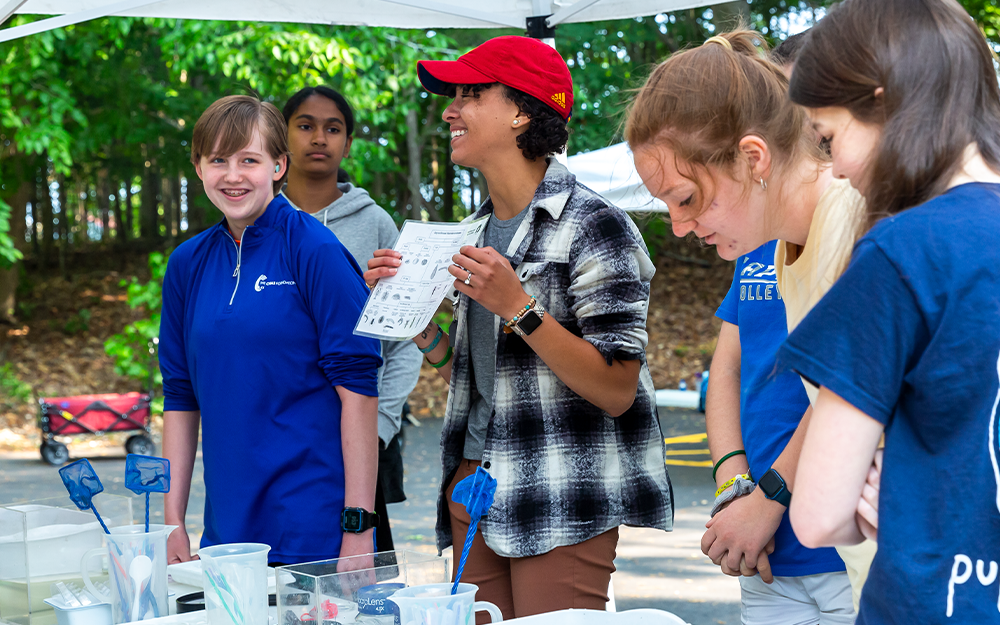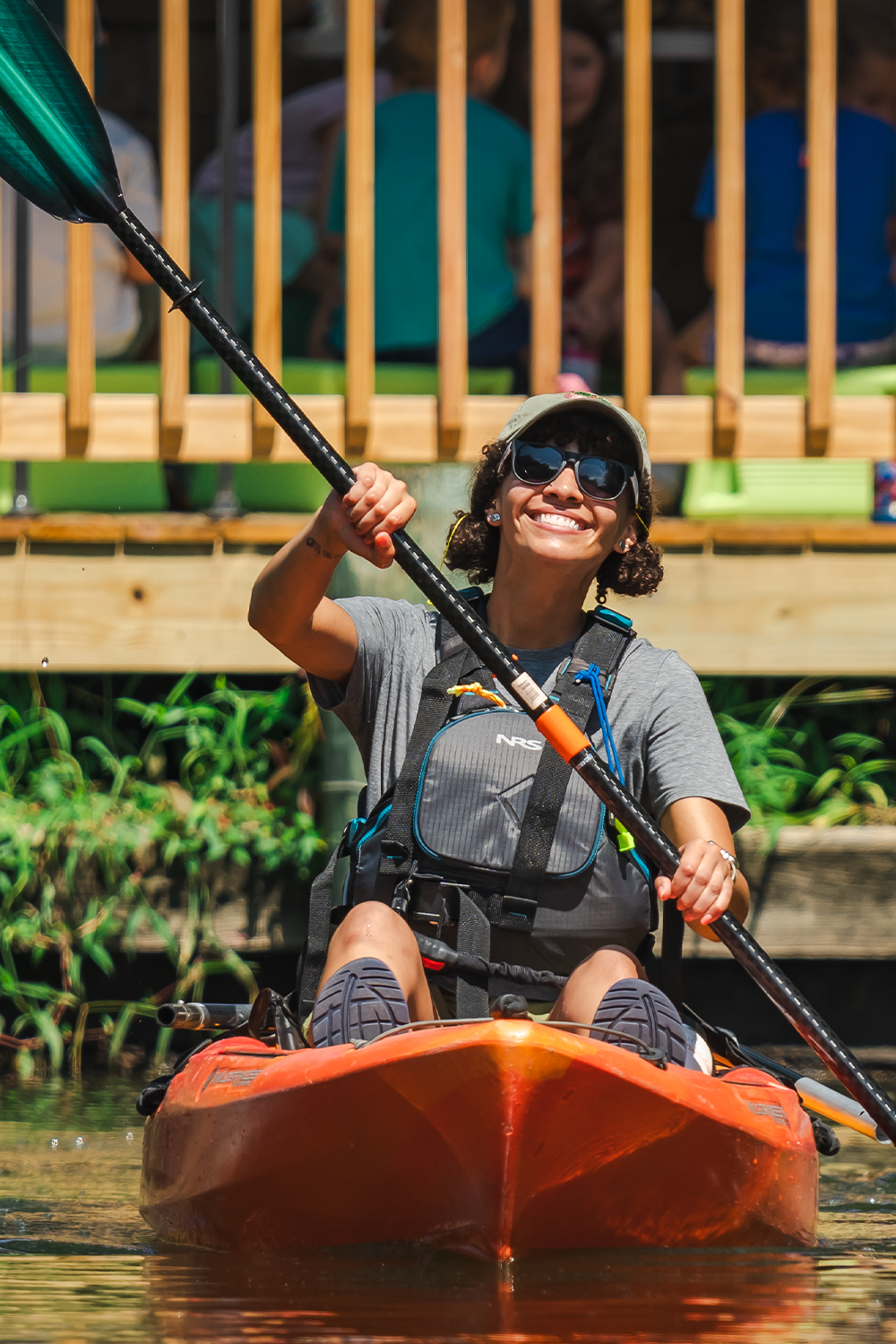Graduate school experiences launch a dream career
Diverse communication opportunities at W&M’s Batten School & VIMS prepared Shantelle Landry M.S. ’21 for her role as a senior science educator
 “I knew that I wanted to do some kind of education, but I did not want to be a schoolteacher,” said Shantelle Landry, describing her thought process while earning an undergraduate degree in marine biology at Roger Williams University. “I wasn’t very familiar with informal education, but I knew it was hard to get into and, even though I did a lot of internships, I had a feeling I needed more training.”
“I knew that I wanted to do some kind of education, but I did not want to be a schoolteacher,” said Shantelle Landry, describing her thought process while earning an undergraduate degree in marine biology at Roger Williams University. “I wasn’t very familiar with informal education, but I knew it was hard to get into and, even though I did a lot of internships, I had a feeling I needed more training.”
At the recommendation of a professor, Landry applied to Willaim & Mary’s Batten School & VIMS. “I went to visit and everyone was super welcoming,” she said. “I loved it, and considered two schools, but VIMS was my top choice by a long shot.” Once enrolled in the Batten School of Coastal & Marine Sciences, Landry discovered an abundance of opportunities to hone her science communication skills, which ultimately led to her current role as a senior science educator at The Mariners' Museum and Park.
Unique research, made possible by community support
Conducting her research in Rochelle Seitz’s community ecology lab, Landry explored ways to jump-start soft shell clam aquaculture in Virginia. “We wanted to see how we could give clams a chance to grow to market size before crabs eat them all,” she said. The team tested various cage mesh sizes and deposited cages at different times of the year. While they found that smaller mesh better blocked hungry crabs, which was expected, they also observed that clams grew surprisingly well in the winter, “which really kind of shocked us.”
 Landry credits the success of her research to the assistance she received from her labmates, and from her husband. “I worked very closely with our lab techs on designing and implementing my project. They were pivotal to my time at VIMS.” she said.
Landry credits the success of her research to the assistance she received from her labmates, and from her husband. “I worked very closely with our lab techs on designing and implementing my project. They were pivotal to my time at VIMS.” she said.
“And my husband is not a VIMS person, but he was in law school while I was in grad school and he didn’t have anything to do over the summer. I said, ‘Hey, I need to deploy my cages, come down and help.’ He did, and became a mini celebrity in my lab.”
The collaborative culture at the Batten School & VIMS was instrumental in cultivating such productive cohort partnerships. Said Landry, “We all clicked super well. VIMS does a great job of putting on different events to get people together, which is nice. I found my core group, which I still talk to almost every day.”
Communication opportunities guide a career path
The Batten School & VIMS graduate programs offer frequent events where students can practice sharing their research with diverse audiences, and Landry jumped at every chance available. “I’m very passionate about communicating science to the public,” she said, “and VIMS provided so many chances to do that between weekly science seminars and other opportunities. I feel like that's a huge struggle area for a lot of scientists and I'm a big believer that our work can’t make much of a difference if people can’t understand what we’re doing.”
 In the spirit of knowledge sharing, Landry took a lead role in organizing one of the Batten School & VIMS’ most popular ongoing events: A Scientist Walks into a Bar, which features casual conversations on environmental topics and is hosted by local bars, breweries and other establishments. “Helping our scientists talk about their research to different audiences was so much fun; I loved doing that.”
In the spirit of knowledge sharing, Landry took a lead role in organizing one of the Batten School & VIMS’ most popular ongoing events: A Scientist Walks into a Bar, which features casual conversations on environmental topics and is hosted by local bars, breweries and other establishments. “Helping our scientists talk about their research to different audiences was so much fun; I loved doing that.”
She also contributed to the Virgina Science & Educator’s Alliance’s (VA-SEA) annual Lesson Plan Expo, which provides K-12 teachers with marine science lesson plans, and assisted with education and outreach initiatives with local Boys and Girls Clubs. Said Landry, “there were so many cool ways for me to learn different techniques on how to communicate with folks and become comfortable with public speaking.”
Living out her dream career
The coronavirus pandemic limited Landry’s job opportunities after graduation, so she initially stayed on with her lab as a technician. “Then I saw that the museum was hiring an environmental science educator, and I said, ‘Oh, that's perfect.’ I interviewed and I've been here since,” said Landry, who has since been promoted to senior science educator.
In her role, Landry plans, executes and generally oversees The Mariners' sixth and ninth grade programming. “I make sure all the supplies are set, make sure the program implementation goes smoothly, and obviously I teach it too. We have interns and volunteers who help us, because the program is a beast and a half,” said Landry. “It's a lot, but outdoor programs are where my heart lies and it's really rewarding.”
 Every sixth grader in Newport News goes on a field trip to The Mariners’ to kayak—most of them for the first time—and participate in land activities, including a mindfulness station intended to help them feel at ease in the outdoors. “They can sit down and draw or write a rap, or we can take them on a nature hike,” said Landry. “And the kayaking is so rewarding because the kids start out uncertain or scared, but by the end they don’t want to leave.”
Every sixth grader in Newport News goes on a field trip to The Mariners’ to kayak—most of them for the first time—and participate in land activities, including a mindfulness station intended to help them feel at ease in the outdoors. “They can sit down and draw or write a rap, or we can take them on a nature hike,” said Landry. “And the kayaking is so rewarding because the kids start out uncertain or scared, but by the end they don’t want to leave.”
The ninth-grade program welcomes environmental science students from Newport News, Hampton and York County for a lake improvement project. The high schoolers help to plant eelgrass, which helps reduce turbidity and increase dissolved oxygen in Mariners’ Lake. Landry described the program as “a really unique opportunity for them to not only get outside but also explore different careers that are usually not advertised to them.”
Advice for those taking a similar path
Having carved out a successful role in informal education, Landry is a valuable source of insights for those looking to emulate her early-career accomplishments. In addition to taking advantage of the diverse communication events offered at the Batten School & VIMS, as she did, Landy also encourages students to pursue opportunities that she overlooked in graduate school.
“I wish I had put myself out there in other ways and had joined more communities,” said Landry. “I wish I had known about the organization Black in Marine Science (BIMS), because, especially for a person of color, you sometimes feel pretty isolated in marine science. It's getting better, but it would've been cool to know that there was that whole community while I was at VIMS. So, look for new opportunities and communities.”
Landry's encouragement that students be open to novel experiences extends to career considerations, as well. “Something we tell our interns all the time,” she said, “is that you might have an idea of what you want to do while you're in school, but don't be afraid to try things that are different because you never know what you're going to discover. You never know what connections you're going to make or what benefits you’ll get. In grad school, we don't want to veer outside of that little tunnel vision that we have, but it can be kind of nice and even a little refreshing to do that.”
This alumni profile was published in August, 2025.

